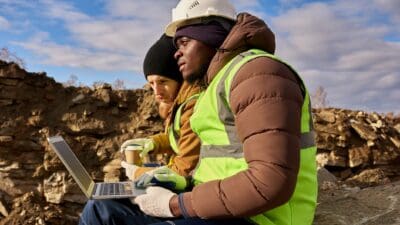The 2021 KPMG Risks and Opportunities for Mining Report has dropped and in it is a picture of the mining industries' future, particularly the importance of ESG strategies.
The annual report surveys mining executives from all over the globe to understand how the industry stands.
Let's take a closer look at what is concerning and exciting one of Australia's biggest industries in 2021.
12 months of challenges
While plenty has changed since the beginning of 2020, mining companies' main concern remains the same: Commodity price risk.
Also concerning industry leaders were economic downturns, a mainstay of 2020, and unsurprisingly, global pandemics.
An earlier report by KPMG, Australian Mining Risk Forecast 2021/21, commended Australian mining companies on their quick actions to protect themselves and their workers from COVID-19.
Further, the report found through the pandemic, consumers returned to invest in historically stable commodities, while government stimulus packages kept mining companies in the green. These combined measures kept commodity prices considerably stable.
Interestingly, companies with large capitalisations viewed economic uncertainty and environmental risks as greater issues than fluctuating commodity prices.
The risks of supply chain bottlenecks were also highlighted during COVID-19, with the report stating the industry is moving to address them.
Perhaps as a reflection on travel restrictions, mining executives now see access to key talent as the ninth biggest risk factor to their organisations.
ESG's are bringing an ethical future to mining
The report found the future of mining is being heralded optimistically. Australian mining companies have already embraced measures deemed by KPMG's report to be essential to the future of mining. Those being strong Environmental, Social and Governance (ESG) measures.
Executives surveyed almost unanimously agreed companies need to have a clear, measurable ESG strategy to be successful. In fact, 83% of those surveyed said success must be measured against the results of a company's ESG strategy.
There is a belief among mining executives that the future of mining will begin soon. With decarbonising efforts underway and a focus on green energy, there will likely be a heightened demand for raw materials to create sustainable energy.
Also, as an effect of COVID-19, the industry's workplace health and safety have been boosted. Particularly mental health care.
The future of mining is ESG
This year, miners are more likely to agree that innovation in the sector won't see job losses. In fact, 82% view technology's advancement as an opportunity instead of a threat.
Within the adoption of technology comes an element of social responsibility – it's imperative to keep jobs local and benefit mining communities.
KPMG has observed a trend in Australia, where technology is adopted faster than in North America. Perhaps this is a reflection of the diverse nature of Australia's mining sector.
Currently, most mining executives believe modern mining companies need to embrace new business models, such as strategic partnerships, private equity funding and Public-Private Partnerships. Nearly two-thirds state the mining industry needs to consolidate to manage costs and risks.
Despite 2020's unique challenges, Australia's mining industry is standing strong and looks to be set for a prosperous future.
Three mining companies with exceptional ESG strategies
Neometals Ltd (ASX: NMT)
A lithium mining company working towards batteries for electric vehicles and the storage of clean energy. It has also partnered with German plant manufacturer SMS group to create Primobius, a lithium-ion battery recycling program. Neometals commits to its strong focus on sustainable corporate governance and community partnerships by supporting local businesses, charities and projects.
Vulcan Energy Resources Ltd (ASX: VUL)
Vulcan is working to decarbonise the lithium-ion battery industry with its zero-carbon lithium product.
Euro Manganese Inc (ASX: EMN)
Euro Manganese stands by a code of ethics and business conduct established in 2017. The code stipulates the company must create as little environmental impact as possible and contribute to local communities to enhance them and practice good corporate governance. The company is a miner of manganese in Europe, which it supplies to the lithium-ion battery industry.









